How Do You Choose The Right LMS For Customer Training

What can customer training do for your business?
Beyond helping your customers better understand your products and services, training makes them self-reliant in solving problems, improving brand trust, and speeding up word-of-mouth referrals.
According to research by TSIA, trained customers are 68% more likely to use a product frequently, 56% more likely to explore features, and 87% more likely to solve issues independently. These statistics show comprehensive training empowers customers, fosters loyalty, and improves user experience. A study by Forrester also shows companies investing in customer training experience an increase in customer satisfaction by 11.6%.
Customer training is imperative! But how can companies drive effective customer training? This blog explains how a robust LMS can help streamline customer training management.
How can large companies effectively conduct customer training?
Gone are the days when companies used PDFs and user guides for customer training. As technology improves and people want more from training, businesses are using Learning Management System Software (LMS) for better training experiences. LMS helps deliver training that’s effective and engaging for users. Let us discuss how.
1. Onboarding and Product Training:
A customer training LMS can streamline onboarding new customers by providing them access to comprehensive training modules. These modules can cover various product or service aspects, including features, functionalities, best practices, and use cases. Including Interactive Multimedia Content such as quizzes, games, and assessments avoids sluggishness and makes learning exciting. When learning becomes exciting, customers quickly understand the products or services, speeding up the onboarding.
2. Ongoing Support and Skill Enhancement:
After the initial onboarding process, an LMS can help continue customer support and skill development. The platform allows Customers to access a library of tutorials, troubleshooting guides, and training materials. This helps them with any questions or problems they might have when using the product or service. The LMS can also provide advanced training courses or certifications to assist clients in gradually advancing their knowledge and proficiency. The LMS helps users stay informed about new features, updates, and industry best practices by offering opportunities for continuous learning. This eventually boosts user satisfaction and loyalty.
What are the Benefits of LMS for Customer Training?
The benefits of using LMS for customer training are immense. Here are a few top reasons to implement an LMS for customer training.
1. Monitoring Learner Progress and Evaluating Performance
A comprehensive reporting and analytics suite within an LMS offers detailed insights into the effectiveness of training programs. Targeted support can be provided to learners struggling in specific areas by tracking completion rates, attempts, and scores, fostering continuous improvement.
2. Scalability
An LMS effortlessly accommodates a growing user base without additional resources. This scalability facilitates reaching a wider audience and executing global training initiatives seamlessly.
3. Flexibility and Convenience
Customers can learn at their own speed, anywhere, on any device. Users can access training materials whenever it’s convenient for them. This convenience increases user engagement and completion rates and enhances information retention.
4. Enhanced User Engagement and Participation
LMS for online customer training has personalized dashboards that empower users to track their progress and explore additional courses, encouraging active participation. Integrating multimedia content, microlearning modules, and social learning experiences enhances engagement and promotes knowledge retention.
Key Considerations for Choosing a Customer Training LMS
1. Intuitive User Interface
An interface that is easy to use is essential to increasing content adoption and engagement. Find an LMS with an innovative, intuitive user interface indicative of well-known consumer software platforms. An intuitive LMS allows users to access content without technical knowledge.
2. Flexible Content Delivery
Creating a training program that suits diverse learning preferences is essential. An LMS that accommodates diverse content types such as videos, PDFS, interactive media, etc., tailor helps businesses customize training programs for diverse learners.
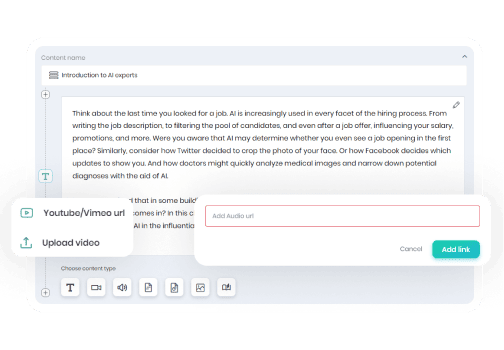
3. Gamification
Training sessions must be exciting and engaging to increase participation, create a positive learning experience, enhance skill development, and more. The training program incorporates gamification elements like badges, quizzes, and leaderboards. Choosing an LMS with gamification features makes the learning experience competitive, enjoyable, and rewarding, leading to better learning experiences.
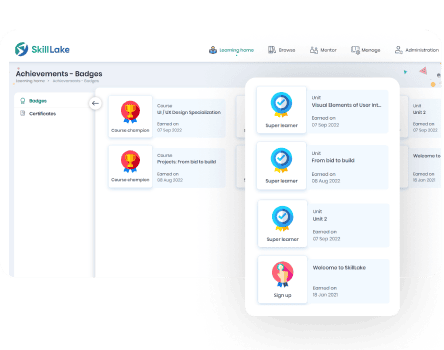
4. Mobile Learning Options
Mobile learning options eliminate the need for physical classrooms, instructor fees, and travel expenses. It also offers a flexible learning experience, allowing learners to control their training sessions. When choosing an LMS, select the one that supports seamless access across different devices and operating systems that facilitates training anytime, anywhere.
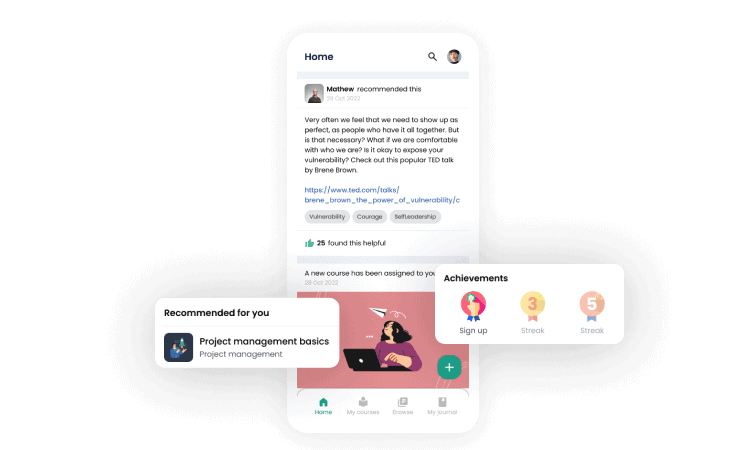
5. Custom & Recommended Learning Paths
Personalization is essential for creating compelling and engaging training experiences. By tailoring the learning experience to individual needs, organizations can maximize the training results and empower their employees to reach their full potential. An LMS that allows customization makes learning more engaging and effective for learners and instructors.
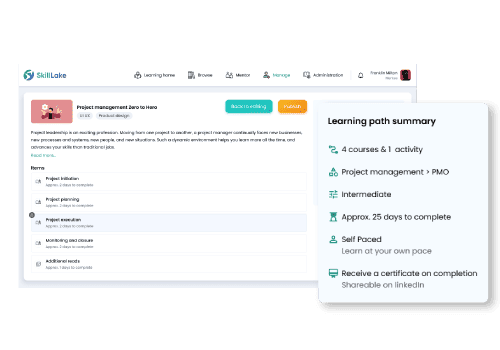
6. Advanced Reporting
Data-driven insights are essential for tracking training development and maximizing its impact. An LMS with strong reporting capabilities provides an in-depth analysis of user participation, completion rates, knowledge gaps, and the overall effect of training.
7. Security
Securing the confidentiality and integrity of training materials and user information is important. To ensure security, prioritize an LMS with strong security features like Single Sign-On (SSO) integration, granular access controls, data encryption, and compliance with industry standards.
Is Skill Lake an Ideal Platform for Customer Training?
Skill Lake excels as the premier platform for customer training, offering a transformative learning experience. Powered by advanced AI and ML, it tailors personalized learning paths to individual preferences, fostering effective skill acquisition. Immersive AR/VR experiences deepen comprehension of complex topics, while robust competency and course management tools enable tailored learning to meet specific objectives.
Skill Lake ensures continuous improvement by supporting various learning modes and providing mentoring and feedback. Gamification elements drive engagement, complemented by bite-sized Learning Bytes and mobile accessibility for convenient learning anywhere. SCORM compliance ensures seamless integration with existing systems, underscoring Skill Lake’s commitment to delivering impactful training experiences.
Build a culture of continuous learning with Skill Lake’s state-of-the-art people development platform. Give your employees professional training to help them excel in their job roles and propel your business to greater efficiency and success.
Start Today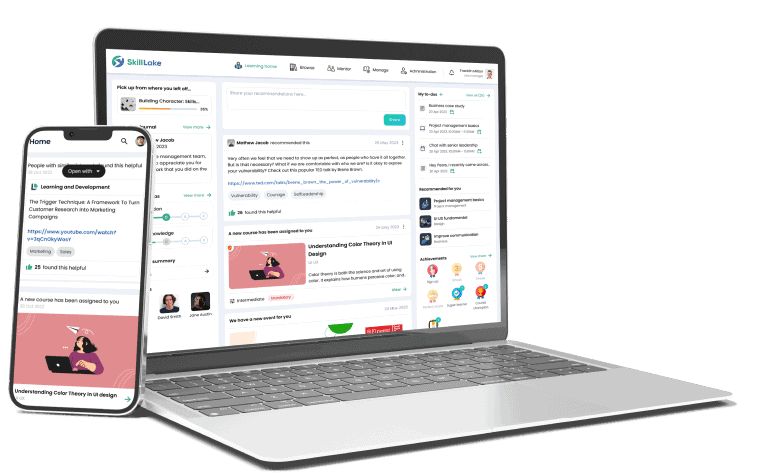


Ashmitha Chatterjee
Ashmitha is a learning and development enthusiast who shares her insights on e-learning. She loves to create engaging and informative content and is dedicated to helping people learn and grow through her deep expertise in the field.